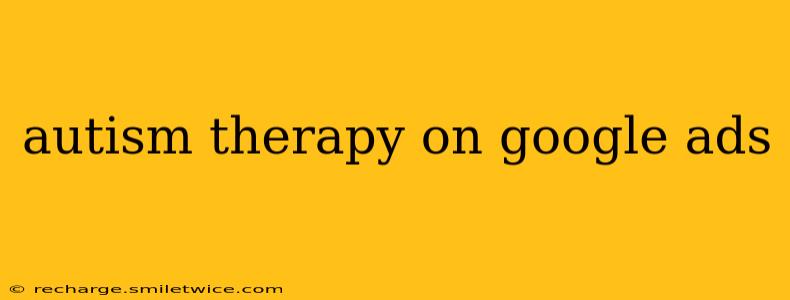Navigating the Complexities of Autism Therapy Advertising on Google Ads
Advertising autism therapy services on Google Ads requires a delicate balance between reaching those who need help and adhering to Google's strict advertising policies. This guide explores the nuances of this specialized advertising landscape, helping you create effective campaigns that are both ethical and successful.
Understanding Google Ads Policies Regarding Healthcare Services
Google has specific guidelines for advertising healthcare services, and autism therapy is no exception. These regulations aim to protect consumers from misleading or inaccurate information. Key areas to understand include:
- Prohibited Claims: You cannot make unsubstantiated claims about cures or guarantees of success. Phrases like "guaranteed results" or "cure autism" are strictly forbidden.
- Sensitive Information: Be mindful of the sensitive nature of autism and avoid exploitative or sensationalized language. Focus on offering support and evidence-based treatments.
- Targeting Restrictions: While you can target specific geographic locations, you must avoid targeting based on protected characteristics like disability. Your targeting should be based on relevant keywords and interests.
- Transparency & Disclosures: Clearly state your qualifications, licensing, and any relevant certifications. Be transparent about the types of services offered and the associated costs.
Keywords and Targeting Strategies for Success
Effective keyword selection is crucial for reaching your target audience. Consider the following strategies:
- Long-Tail Keywords: Focus on long-tail keywords, which are more specific phrases that reflect the precise needs of potential clients. Examples include "ABA therapy for autistic toddlers near me," "speech therapy for nonverbal autistic children," or "occupational therapy for autistic adults with sensory processing disorder."
- Location Targeting: Use precise location targeting to reach families within your service area. This ensures that your ads are shown to people who can actually access your services.
- Negative Keywords: Implement negative keywords to exclude irrelevant searches and improve the quality of your campaign. This will save you money and prevent wasted ad spend. For example, you might add negative keywords like "cure autism" or "miracle autism treatment."
H2: What are the best practices for advertising autism therapy on Google Ads?
Best practices revolve around transparency, accuracy, and ethical considerations. This includes:
- Accurate Ad Copy: Use clear and concise language that accurately reflects your services. Avoid jargon or overly technical terms.
- Compelling Call to Action: Include a strong call to action, encouraging potential clients to contact you for a consultation or learn more about your services.
- High-Quality Landing Page: Your landing page should be informative, easy to navigate, and directly relevant to your ad copy. Provide information on your qualifications, treatment approaches, and client testimonials (with consent).
- Continuous Monitoring & Optimization: Regularly monitor your campaign performance and make adjustments to optimize your keywords, bids, and ad copy.
H2: How much does it cost to advertise autism therapy on Google Ads?
The cost of advertising autism therapy on Google Ads varies significantly based on several factors, including:
- Competition: The level of competition in your geographic area will impact your cost-per-click (CPC).
- Keywords: More competitive keywords will typically have higher CPCs.
- Bidding Strategy: Your bidding strategy (e.g., automated vs. manual) will also influence your costs.
- Ad Quality: High-quality ads with relevant keywords and a compelling message can improve your ad rank and lower your costs.
It's important to set a realistic budget and track your spending carefully to ensure a positive return on investment.
H2: What are the legal and ethical considerations when advertising autism therapy services?
Advertising autism therapy requires strict adherence to legal and ethical guidelines. Key considerations include:
- HIPAA Compliance: Ensure your advertising practices comply with HIPAA regulations regarding the protection of patient health information.
- Licensing and Certification: Clearly state your qualifications and licensing information in your advertising materials.
- Avoiding Misleading Claims: Refrain from making any unsubstantiated claims about the effectiveness of your treatments.
- Transparency in Pricing: Clearly outline your fees and payment policies.
H2: How can I ensure my Google Ads campaign complies with Google's policies?
To ensure compliance, thoroughly review Google's advertising policies related to healthcare services, especially those concerning autism therapy. Before launching a campaign, carefully review your ad copy and landing page to ensure they adhere to these policies. Google provides tools and resources to help advertisers understand and comply with their regulations.
By following these guidelines and prioritizing ethical considerations, you can create successful Google Ads campaigns that connect you with families who need your autism therapy services while maintaining the highest standards of professionalism and integrity. Remember to consult with legal counsel specializing in healthcare advertising to ensure full compliance.
